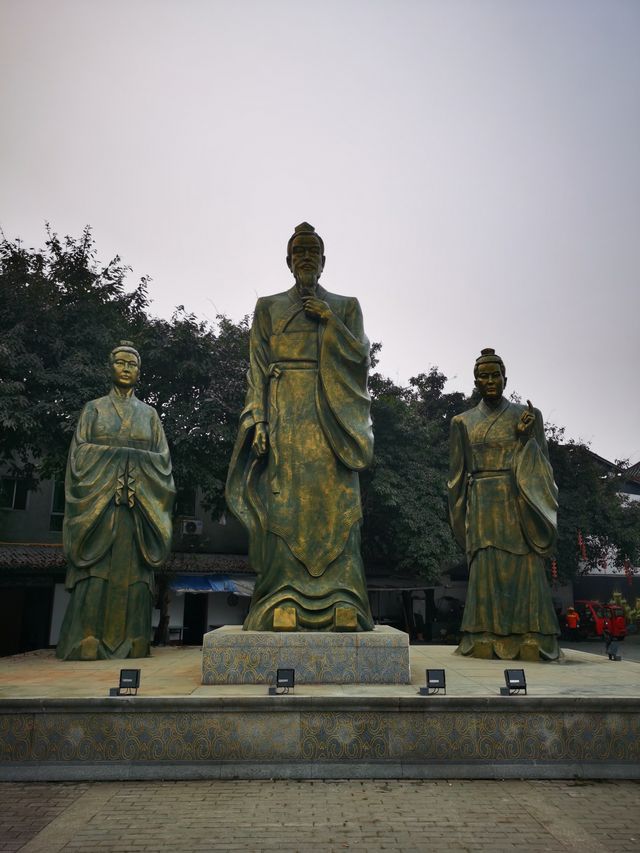A Hidden Gem Near Chengdu - Xiaquan Ancient Town in Deyang
@1r3th_1llum1n@t1
Introduction to the Confucian Temple in Deyang
EmberFlameshadow82
Deyang Confucian Temple
CHANEL MENDOZA
Jazz & Coffee
Edgar_Cardenas
Popular Trip Moments
Introduction to the Confucian Temple in Deyang | Retreating to the mountains, I really want to visit this private hot spring guesthouse again! | Deyang Shangyong Long Que | Yes, you can play for free in the super unpopular fairyland in Sichuan | Deyang Confucian Temple | Explore the Scroll of Mountains and Waters - The Enchanting Journey to Taiping Reservoir | Chengdu Parent-Child Homestay | Wheat Field Greenery Private Hot Spring! Great for walking with kids! | Sanxingdui Museum, taking you through the ancient Shu civilization | Experience the culture and wisdom from 3,000 years ago | Not in Malaysia|Just around Chengdu | The parent-child themed B&B is truly unrivaled! | Who would have thought that this industrial hub near Chengdu is hiding such a beautiful and niche photography spot | Mianzhu Journey: Capture the essence of New Year paintings, customs, and fun in one go, and experience the charm of traditional culture | Sanxingdui Museum · A must-visit in this lifetime | The ancient moon over Luo City remains, while the Sanxingdui Museum is a newfound internet sensation | Outing with Kids Around Chengdu! Predicting the Next Hot Spot with a Guide | A Hidden Gem Near Chengdu - Xiaquan Ancient Town in Deyang | Not Germany! It's Deyang! Found the castle in the Emoji! | I've been asked countless times! You must stay at this magical homestay with kids | Near Sanxingdui, you can fulfill all your pastoral fantasies | As soon as the hotel is completed, the price is guaranteed to increase in the scenic area | Get close to nature at Donghu Mountain Park, the largest suburban park in Deyang | Sanxingdui Exhibition Guide | Slumbering for thousands of years, its awakening shocks the world | Deyang Stone Carving Park, a journey through a thousand years of mythology | Chengdu weekend getaway: Yijia River Dam | The on-site experience is truly breathtaking! | Zhuang Shengxiao Moon | Spring Daylight and Shadows | Guanghan·Zhuang Sheng Xiao Yue, a classical garden private bath hotel next to Sanxingdui! | Off-the-beaten-path views offer a unique scenery | Enjoy flower viewing and camping | Explore the Ancient Shu Civilization: A One-Day In-Depth Tour at Sanxingdui Museum
Popular Travel Types
Popular Destinations
St Ives Travel | Dublin Travel | Nottingham Travel | Xiamen Travel | Malaysia Travel | Brisbane Travel | Hersonissos Travel | Dhaka Travel | Cape Town Travel | Guilin Travel | Bucharest Travel | Lanzarote Travel | Wellingborough Travel | Lijiang Travel | Camarines Sur Travel | Reykjavik Travel | Putrajaya Travel | Iloilo City Travel | United States Travel | Satun Travel | Bratsk Travel | Wilyabrup Travel | Elba Island Travel | Sequim Travel | Ortona Travel | Kunene Travel | Scharbeutz Travel | Cape Elizabeth Travel | Phang Nga Province Travel
Recommended Attractions at Popular Destinations
Bangkok attraction near me | Tokyo attraction near me | Manila attraction near me | Hong Kong attraction near me | Taipei attraction near me | Seoul attraction near me | Los Angeles attraction near me | New York attraction near me | Shanghai attraction near me | Kuala Lumpur attraction near me | Shenzhen attraction near me | Osaka attraction near me | Singapore attraction near me | London attraction near me | Guangzhou attraction near me | San Francisco attraction near me | Beijing attraction near me | Macau attraction near me | Bali attraction near me | Paris attraction near me | Ho Chi Minh City attraction near me | Orlando attraction near me | Jakarta attraction near me | Phuket attraction near me | Chicago attraction near me | Toronto attraction near me | Fukuoka attraction near me | Istanbul attraction near me | Dallas attraction near me | Cebu attraction near me
Popular Attractions
Universal Studios Hollywood | Vana Nava Water Jungle | Khaosan Road | Colosseum | Splendid China Folk Village | Chinatown | Window of the World | Magic Kingdom Park | Lingyin Temple | Keukenhof | Louvre Museum | Penida Island | Walt Disney World Resort | Gourmet Chocolate Museum | Windermere | Royal Botanic Gardens, Kew | Brighton i360 | Shaanxi History Museum | Teizan Park | Cliff Drive Park | Faith Baptist Church | Belediye Parkı | St. Michael's Ukrainian Greek Catholic Church | "Alte Mühle" (ehem.Tütgemühle) | Col·leccio d'Automobils Salvador Claret | 石龜溪熊貓彩繪村 | Mt Sinai Tabernacle Baptist Ch | Surfing Walk of Fame | Nui Beach | Sagrada Familia
Popular Restaurants in Deyang
宾GO lot(德阳印象汇店) | 勇记干锅居(德阳店) | 黑釜·亚洲烧烤融和料理(102生活广场店) | 初原割烹手作 | 7Ke cake | 善心缘素食餐厅(翠湖街店) | 好利来(上美店) | 方竹苑重庆老鸭汤锅 | 昊·来了寿司(洋洋百货店) | 心岸(天籁福店) | Yizhisuannainiu (wenmiao) | 名人咖啡·餐吧 | DQ | 写诚咖啡·空中庭院 | 必胜客(岷江西路店) | 德阳老号肖记片粉 | LIU YUE XUE KAI DE DIAN | 爱达乐(钟鼓楼店) | 爱达乐(彩泉新店) | 土巴碗火锅庭院(香飘飘店) | 森林雨火锅食府(万兴店) | 禾悦韩式自助烤肉(德阳店) | 清芳源牛排火锅 | 德香苑北京烤鸭(德阳凯旋店) | Longbingfen (fangcaodi) | 土灶王山城老火锅 | 鑫御隆斑鱼庄(德阳店) | Niniyatiebanshao.kaorouzizhu Restaurant (zhonggulouzong) | 聚龙砂锅居(彩泉店) | 雅安特色铁板烧(阳光摩尔商业广场店)
Payment Methods
Our Partners
Copyright © 2024 Trip.com Travel Singapore Pte. Ltd. All rights reserved
Site Operator: Trip.com Travel Singapore Pte. Ltd.
Site Operator: Trip.com Travel Singapore Pte. Ltd.








































